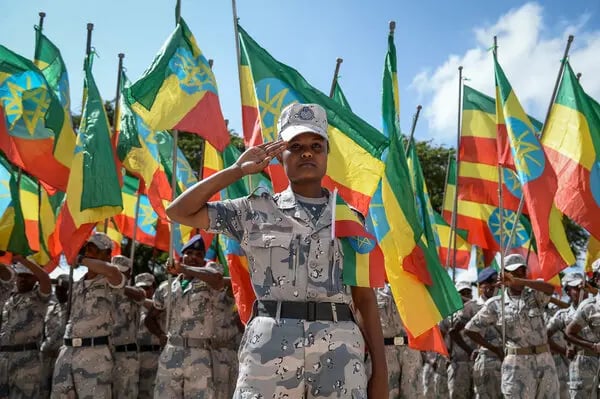Fractured Unity: How Ethiopia's Internal Wars Are Reshaping Its Future
Sohaila Shamseldeen International Relations Researcher | Master of Law & Economics, University of Hamburg
8/6/20253 min read


For decades, Ethiopia was a beacon of stability in the turbulent Horn of Africa—an emerging economic powerhouse known for its rapid growth, ambitious infrastructure projects, and role as a regional peacekeeper. But this narrative of progress has been shattered. Deep-seated internal conflicts, particularly the devastating war in Tigray and sustained unrest in Oromia, have plunged the nation into a crisis that threatens to unravel decades of development and fundamentally alter its place in the world.
Once one of Africa's fastest-growing economies, Ethiopia's progress has been brought to a screeching halt. Its reputation as a regional anchor state is eroding, and its relationships with global partners are being redefined. This is the story of how Ethiopia’s internal fractures are reshaping its economic future and its power in the Horn of Africa.
The Human and Economic Toll of Conflict
The scale of the crisis is staggering. The Tigray War, which began in late 2020, has resulted in an estimated 600,000 deaths, making it one of the deadliest conflicts of the 21st century. It has triggered a massive humanitarian catastrophe, with millions displaced and pushed to the brink of starvation.
At the same time, a persistent insurgency in Oromia, Ethiopia's largest and most economically vital region, continues to fuel instability. Together, these conflicts have had a devastating economic impact:
Economic Growth Halted: After enjoying average GDP growth of over 9% for nearly two decades, Ethiopia's economy has slowed to a crawl, growing at less than 4% since 2021.
Infrastructure Destroyed: Key transportation corridors and industrial parks, once symbols of Ethiopia's economic ambition, were shut down or destroyed, crippling trade and manufacturing.
Soaring Debt and Humanitarian Costs: The conflicts have decimated export revenues and drained public finances. Ethiopia is now at high risk of debt distress, while over 20 million of its citizens require food aid, diverting scarce resources from long-term development.
Investor Confidence Shattered: Foreign direct investment has plummeted as international investors, including once-enthusiastic partners from China and the Gulf, have grown wary of the escalating security risks.
Ethiopia's ambitious Homegrown Economic Reform program, which aimed to transform the nation into a lower-middle-income country by 2025, now hangs in the balance. The very foundations of its economic miracle are cracking under the weight of conflict.
A Shifting Geopolitical Landscape
The fallout from Ethiopia's internal wars extends far beyond its borders, undermining its long-held status as a stabilizingforce in the Horn of Africa. The Tigray war strained relations with neighboring Eritrea and Sudan, complicated delicate negotiations over the Grand Ethiopian Renaissance Dam (GERD), and damaged its credibility as a reliable peacekeeping partner in the region.
This has prompted a major reassessment from Ethiopia's international allies:
A Pivot from Western Partners: While humanitarian aid continues to flow, key Western partners like the U.S. and the EU have suspended direct budget support and vital trade benefits, such as the African Growth and Opportunity Act (AGOA), citing human rights concerns.
A More Cautious China and Gulf: China, Ethiopia's largest bilateral lender, has scaled back new loans, while investors from the Gulf have put major projects on hold, demanding greater security and stability.
Weakened Regional Influence: Ethiopia's ability to lead within regional bodies like the African Union (AU) and the Intergovernmental Authority on Dvelopment (IGAD) has been compromised, as its internal turmoil limits its capacity to mediate regional crises.
Unless Ethiopia can resolve its deep-seated ethnic and political fault lines, it risks a continued slide into economic stagnation and diplomatic isolation.
The Path Forward: A Call for Reconciliation and Reform
The link between internal stability, economic prosperity, and regional power is undeniable. To reverse its current trajectory, Ethiopia must prioritize a path of inclusive dialogue and institutional reform. The following steps are critical:
Prioritize Inclusive National Dialogue: The first and most crucial step is to foster a genuine, broad-based national dialogue that addresses the root causes of ethnic and political grievances. Lasting peace cannot be imposed; it must be built on a foundation of trust and mutual respect.
Embed Conflict-Sensitive Development: Economic planning must be tied to equitable regional development. Infrastructure projects and industrial parks should deliver tangible benefits to historically marginalized areas to counter feelings of exploitation and neglect.
Rebuild Investor Confidence: Restoring a secure and predictable investment climate is essential. This requires not only an end to active conflict but also the implementation of transparent governance and legal reforms that protect investments.
Strengthen Local Peacebuilding: Empower local communities to mediate disputes before they escalate. Well-funded, locally-led peace councils can play a vital role in healing divisions from the ground up.
Re-engage with Global Partners: To rebuild trust, Ethiopia must demonstrate a credible commitment to human rights, good governance, and regional stability. This will be key to unlocking debt relief, restoring development aid, and reclaiming its role as a leader in the Horn of Africa.
Ethiopia stands at a critical crossroads. The path it chooses now will determine whether it can heal its fractures and reclaim its promise as a prosperous and stable anchor of the Horn, or whether it will continue down a devastating path of conflict and decline.
Download full study here.
Empowerment
Amplifying African voices for sustainable progress together.
Contact US
Growth
Street No. 3281, N'Djamena, Republic of Chad.
© 2024. All rights reserved.